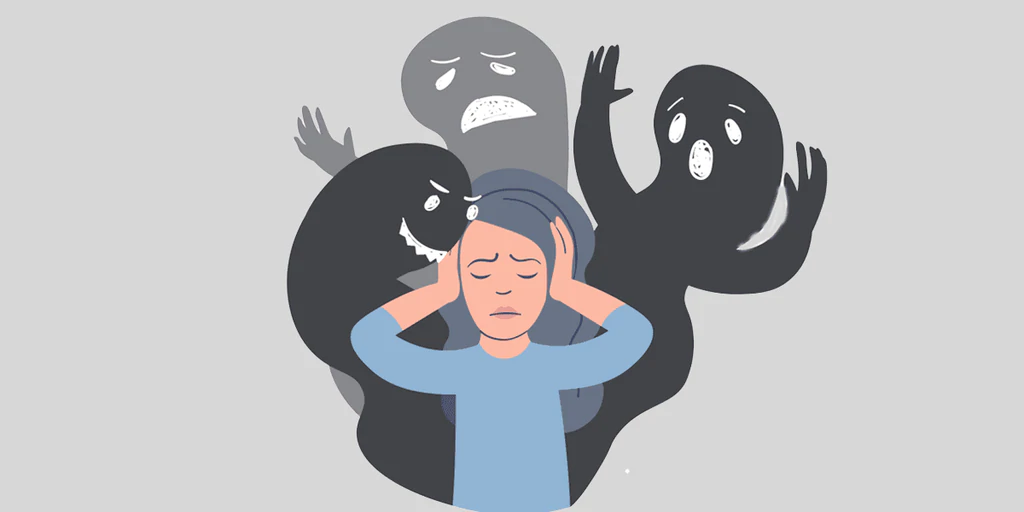Do you ever feel like you’re on a roller coaster? One minute you’re up, and the next minute you’re down. This is how it feels to have a manic episode. A manic episode is a part of bipolar disorder, and it can be a very scary experience. In this blog post, we will discuss what a manic episode is, as well as some of the symptoms that you may experience. We will also talk about how to get help if you are experiencing a manic episode.
Contents
- 1 Defining Manic Episode
- 2 Related Conditions
- 3 Symptoms
- 4 Triggers Of A Manic Episode
- 5 Side Effects
- 5.1 Thoughts of harming yourself or others
- 5.2 Loss of job
- 5.3 Financial problems
- 5.4 Strained relationships
- 5.5 Hallucinations
- 5.6 Delusions
- 5.7 Extremely reckless behavior
- 5.8 Lack of appetite
- 5.9 Fatigue
- 5.10 Feeling like you’re “out of control”
- 5.11 Getting into legal trouble
- 5.12 Anxiety and depression
- 5.13 Irritability
- 5.14 Paranoia
- 6 Treatment Options
- 7 Conclusion
Defining Manic Episode
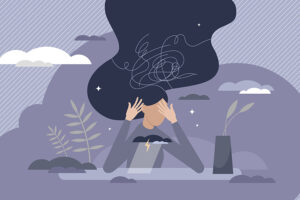
A manic episode is a period when you experience an abnormal mood. This mood can be either extremely happy or extremely angry. You may also experience other symptoms, such as delusions or hallucinations. A manic episode typically lasts for at least two weeks.
Manic episodes are often followed by a period of depression. This is why bipolar disorder is sometimes referred to as a “roller coaster” disorder. They can be very difficult to deal with, but there are treatments available that can help.
It is important to note that manic episodes are different from simply feeling happy or angry. The mood changes that occur during a manic episode are much more severe. They can also be accompanied by other symptoms, such as paranoia or delusions. The intensity and duration of the symptoms are what make a manic episode different from simply feeling happy or angry.
Related Conditions
Oftentimes, people confuse manic episodes with other familiar-sounding conditions. It is important to have a clarified distinction and understanding of them all. These include:
- Psychosis: A mental state in which you lose touch with reality. Psychosis can include hallucinations or delusions.
- Maniac: A very energetic and enthusiastic person.
- Hypomanic episodes: A less severe form of manic episodes. Hypomanic episodes are characterized by a less intense mood and shorter duration.
- Bipolar disorder: A mental illness that causes you to experience extreme mood changes. Bipolar disorder can cause you to have both manic and depressive episodes.
- Depressive episodes: A period of time when you experience a depressed mood. Depressive episodes can cause you to lose interest in activities, have trouble sleeping, and feel hopeless.
- Cyclothymia: A less severe form of bipolar disorder. Cyclothymia is characterized by milder mood swings.
- Schizophrenia: A mental illness that causes you to experience delusions, hallucinations, and disorganized thinking.
While all of these terms have some similar characteristics to a manic episode, they are not the same thing. It is important to get a proper diagnosis from a mental health professional if you think you may be experiencing a manic episode.
Symptoms
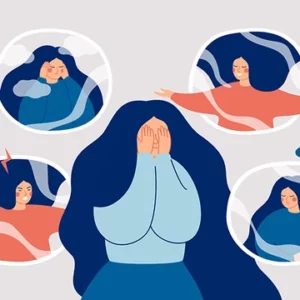
There are a variety of symptoms that you may experience during a manic episode. These include:
- feeling overly happy or “high”
- having lots of energy
- talking very fast
- having racing thoughts
- being easily distracted
- acting impulsively or recklessly
- feeling very happy or very angry
- not being able to sleep
- engaging in risky behaviors
It is important to note that not everyone who experiences a manic episode will have all of the same symptoms. Some people may only experience a few of the symptoms, while others may experience many.
Triggers Of A Manic Episode
There are a variety of things that can trigger a manic episode. Some of the most common triggers include:
- changes in sleep patterns: This can include either sleeping too much or not being able to sleep.
- stressful life events: This can include things like losing a job, getting divorced, or experiencing the death of a loved one.
- drug abuse: using drugs or alcohol can trigger a manic episode
- changes in medications: if you are taking medication for bipolar disorder or another mental illness, changes in your dosage or medication can trigger a manic episode.
It is important to remember that everyone is different and what may trigger a manic episode for one person may not trigger it for another. If you are concerned that you may be at risk for a manic episode, it is important to speak with your doctor.
Side Effects
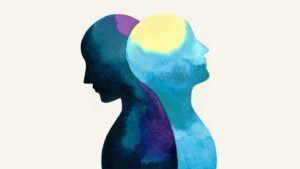
Manic episodes are serious and can have a number of negative side effects. These include:
Thoughts of harming yourself or others
One of the most dangerous side effects of a manic episode is the risk of harming yourself or others. This can include thoughts of suicide or homicide. If you are experiencing these thoughts, it is important to seek help immediately.
Loss of job
Another potential side effect of a manic episode is the loss of your job. This can occur because of the symptoms that you are experiencing. For example, if you are talking very fast, it may be difficult for others to understand you. This can make it hard to do your job or communicate with co-workers. You may also act impulsively or recklessly, which can lead to losing your job.
Financial problems
Another common side effect of a manic episode is financial problems. This can occur because you may make impulsive purchases or engage in risky behaviors. For example, you may spend a lot of money on unnecessary things, or you may gamble and lose a lot of money.
Strained relationships
The symptoms of a manic episode can also strain your relationships. This is because the symptoms can make it difficult to communicate with others or may cause you to act impulsively. For example, you may say things that are hurtful to your loved ones or engage in risky behaviors that could put them in danger.
Hallucinations
It’s not uncommon to see things or people during a manic episode that don’t exist. For example, you may see bugs crawling on your skin when there are none. These feelings are called hallucinations, and they can be very frightening.
Delusions
A delusion is a fixed false belief. During a manic episode, you may believe things that are not true, such as thinking you have superpowers or that you are famous. This makes it difficult to function in day-to-day life. Delusions can be very dangerous, as they can lead you to act in ways that are harmful to yourself or others.
Extremely reckless behavior
This can include anything from spending all of your money on unnecessary things to engaging in risky behaviors like unprotected sex or driving recklessly. This behavior can be very harmful to yourself and others. These may result in long-term problems like financial ruin or jail time.
Lack of appetite
Manic episodes make it hard to eat or sleep. This can lead to weight loss and dehydration. This can lead to other health problems, such as electrolyte imbalance or malnutrition. This may cause you to feel weak and tired.
Fatigue
During a manic episode, you may feel like you have unlimited energy. However, this can lead to fatigue and exhaustion. This can make it hard to function in day-to-day life. Even if you are not sleeping, you may feel very tired during a manic episode. This fatigue can make it hard to function in day-to-day life.
Feeling like you’re “out of control”
One of the most difficult things about a manic episode is feeling like you are out of control. This can be very scary and make it hard to function in day-to-day life. For example, you may feel like you can’t stop talking or that you have to keep moving. This can make it hard to focus on anything else.
Getting into legal trouble
Another potential side effect of a manic episode is getting into legal trouble. This can occur because of the behaviors that you engage in during a manic episode. For example, you may drive recklessly or get into fights with people. If you are arrested, it is important to tell the police that you have bipolar disorder and that you are experiencing a manic episode.
Anxiety and depression
During a manic episode, you may also experience anxiety and depression. This can be very difficult to deal with, as it can make the symptoms of a manic episode even worse. For example, if you are feeling depressed, it may be hard to motivate yourself to do anything. If you are feeling anxious, you may be constantly on edge and have a hard time relaxing.
Irritability
Another common symptom of a manic episode is irritability. This means that you may be easily angered or frustrated. This can make it difficult to communicate with others or maintain relationships.
Paranoia
During a manic episode, you may also experience paranoia. This means that you may be suspicious of others or feel like they are out to get you. This can make it difficult to trust people or to function in day-to-day life.
This list is not exhaustive, but these are some of the most common symptoms of a manic episode. The side effects of a manic episode can be very severe. If you or someone you know is experiencing a manic episode, it is important to seek help from a mental health professional immediately. There are treatments available that can help manage the symptoms and improve your quality of life. Manic episodes can be very dangerous, and it is important to get treatment as soon as possible.
Treatment Options
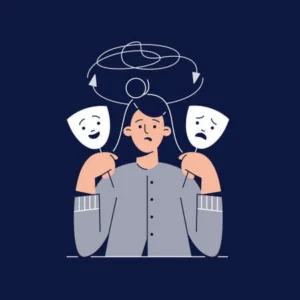
A manic episode is a very difficult thing to go through. However, with treatment, it is possible to manage the symptoms and live a healthy and happy life.If you think you may be experiencing a manic episode, please seek help from a mental
Therapy
One of the most effective treatments for a manic episode is therapy. Therapy can help you understand your thoughts and feelings, and develop coping mechanisms to deal with the symptoms. Some common types of therapy for manic episodes include:
- Cognitive-behavioral therapy: This type of therapy can help you change the negative thought patterns that may be contributing to your manic episode.
- Interpersonal therapy: This type of therapy can help you understand and manage your relationships.
- Family therapy: This type of therapy can help you and your family understand and support each other during a manic episode.
- Psychodynamic therapy: This type of therapy can help you understand the root causes of your disorder and work through them in a safe and supportive environment.
Your preferred style of therapy will depend upon your comfort level and the therapist’s recommendation.
Medication
Another treatment option for a manic episode is medication. There are many different types of medication that can be used to treat a manic episode. Medication can help stabilize your mood and make it easier to function in day-to-day life.
Some common examples of medication include:
- Antidepressants: These medications can help to stabilize your mood and relieve symptoms of depression. Some examples include fluoxetine (Prozac), sertraline (Zoloft), and paroxetine (Paxil).
- Mood stabilizers: These medications can help to stabilize your mood and prevent manic episodes. Some examples include lithium, valproate (Depakote), and carbamazepine (Tegretol).
- Antipsychotics: These medications can help to relieve symptoms of psychosis, such as paranoia or delusions. Some examples include risperidone (Risperdal) and olanzapine (Zyprexa).
- Anti-anxiety medication: This type of medication can help to reduce anxiety and make it easier to relax. This includes benzodiazepines such as lorazepam (Ativan) and diazepam (Valium).
Your doctor will work with you to find the best medication for your needs. It is important to take medication as prescribed, even when you are feeling better. Stopping the medication suddenly can cause severe side effects. Therefore, it is important to be monitored closely by a doctor when starting a new medication.
Hospitalization
In some cases, hospitalization may be necessary during a manic episode. This is usually only done if the person is in danger of harming themselves or others, or if they are not able to take care of themselves.
Hospitalization can provide a safe and controlled environment where you can receive treatment for your disorder. Treatment may include medication, therapy, and other support services. These can include:
- Individual therapy: This type of therapy can help you understand your thoughts and feelings, and develop coping mechanisms to deal with the symptoms.
- Group therapy: This type of therapy can provide support and guidance from others who are going through a similar experience.
- Support groups: These groups can provide support, information, and resources for people with a mental illness.
- Aftercare planning: After being discharged from the hospital, it is important to have a plan in place for continuing treatment. This may include medication, therapy, and other support services.
It is essential to have strict supervision by your doctor for monitoring and assessing the need for hospitalization.
Self Help Strategies
There are many things that you can do to help manage a manic episode. Some self-help strategies include:
- Get regular exercise: Exercise can help to improve your mood and reduce stress.
- Eat a healthy diet: Eating a healthy diet can help to improve your mood and give you the energy you need to get through the day.
- Get enough sleep: Getting enough sleep can help to improve your mood and reduce fatigue.
- Stick to a routine: Try to stick to a regular sleep schedule, eat healthy meals, and exercise regularly.
- Avoid drugs and alcohol: Drugs and alcohol can make symptoms worse and can lead to risky behavior.
- Monitor your moods: Keep track of your moods so that you can identify triggers and early warning signs of a manic episode.
- Learn stress management techniques: Stress can trigger or worsen symptoms of a mental illness. Learning how to manage stress can help prevent or reduce the severity of an episode.
- Build a support network: Having supportive family and friends can make all the difference during a difficult time.
These are just a few self-help strategies that can be helpful during a manic episode. If you or someone you know is experiencing symptoms of a mental illness, it is important to seek professional help. Early intervention can make all the difference in managing the disorder.
If you or someone you know is going through a manic episode, please seek help from a mental health professional immediately. There are treatments available that can help manage the symptoms and improve your quality of life. There are many different treatment options available, and your doctor can work with you to find the best course of treatment for your needs. With proper treatment, people with a mental illness can lead happy and fulfilling lives.
Conclusion
Mental illness is a very difficult thing to deal with. However, with treatment and support, it is possible to live a healthy and happy life. If you or someone you know is experiencing a manic episode, please seek help from a mental health professional immediately. There are treatments available that can help manage the symptoms and improve your quality of life. Manic episodes can be very dangerous, and it is important to get treatment as soon as possible.
For more information, please contact MantraCare. Bipolar disorder is a mental illness characterized by extreme shifts in mood, energy, and activity levels. If you have any queries regarding Online Bipolar Disorder Counseling experienced therapists at MantraCare can help: Book a trial Bipolar Disorder therapy session
